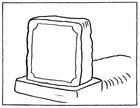Shanghai Street View: Mass Movements

Graveyards in and around Shanghai are probably breathing a collective sigh of relief after the Tomb Sweeping holiday, knowing they can take can now take a long break until they’re flooded again with the next mass migration of people honoring their ancestors. This year’s rush saw not only our local graveyards flooded with visitors, but also produced the usual crush of cars congesting nearby roads and commuters packing our public transport system.
Obviously this annual pilgrimage doesn’t affect me or most other foreigners living in Shanghai. But it did get me to thinking about how we honor the deceased in the west, and why we don’t have a similar tradition to the annual Tomb Sweeping rush.
That was when I realized the Tomb Sweeping rush is just one of many such regular travel crunches in China. The granddaddy of those, of course, is the annual Spring Festival pilgrimage that sees hundreds of millions of Chinese all try to travel at the same time to get home for annual family reunions. This kind of mass rush seems particularly Chinese, or at least Asian, though it’s certainly become far more common in the last 20 years as people have become more mobile.
Officials have gotten quite good at handling these rushes, though the resulting challenges of crowd control were also thrust into the spotlight with this year’s tragic New Year’s Eve stampede at the Bund. A look at the latest figures for the Tomb Sweeping holiday rush revealed yet another mass movement of similar magnitude, this time to visit local graveyards.
According to the latest figures, a whopping 3 million people from Shanghai made visits to their ancestors’ graves over the holidays. That flood of travelers produced major traffic jams on city highways as nearly 300,000 cars crammed local roads over the long weekend, creating back-ups stretching as far as 10 kilometers.
While those numbers may sound high, the total number people honoring their ancestors was actually down 13 percent from last year, and the number of vehicles was down by 7 percent. Part of that was probably due to the cold and rainy weather during the holiday. But I also like to think the decline could mark the start of a new trend, which is seeing younger people abandon the “rush” mentality that seems so deeply engrained in the traditional Chinese consciousness.
The reports on the rush prompted me to wonder why there’s no similar custom in the west, since honoring the dead certainly isn’t limited to China. Many people in the US do indeed honor their deceased ancestors, though many of us don’t as well. But people who do so usually choose a date of personal significance, often the anniversary of a relative’s death or perhaps his or her birthday.
Such an approach has the practical effect of de-centralizing the act of remembering the dead, meaning the flow of people to cemeteries is spread more evenly throughout the year. That has the added benefit of allowing individual visits to be a bit quieter and more private.
I thought about it some more, and realized similar discrepancies between the west and China occur in other areas as well. One of those is birthdays, which are celebrated in the west on the actual day a person was born. By comparison, most of my friends here don’t see their actual birth date as anything special, and instead most use the Lunar New Year as a sort of mass “birthday” to add a year to their age.
The list goes on, and includes a preference among many, especially from the older generation, for dining out in large banquet-style environments, often in private rooms with a dozen or more people seated around the table. That contrasts with my own preference, and a western preference in general, for more private outings with one or two individual friends when we eat out.
Travel rushes for holidays like Spring Festival and the Tomb Sweeping holiday are relatively recent phenomena, since most people previously lived in or near their hometowns and honoring the ancestors wasn’t encouraged. But the tradition of dining out in banquets forms some of my earliest memories of China from the 1980s, often accompanied by drinking large quantities of baijiu.
Those banquets seem to be fading in popularity these days, partly due to the recent government austerity drive but also as more people opt for the private style of dining out with just a few friends versus the large crowd. Perhaps the surprising fall in Tomb Sweeping visitors hints at a similar trend for that particular holiday. Such a shift may mark a break with some older traditions, but would provide some needed relief for our congested roads and cemeteries, and also for the millions of frazzled people who are used to all setting out with the same goal at the same time.
